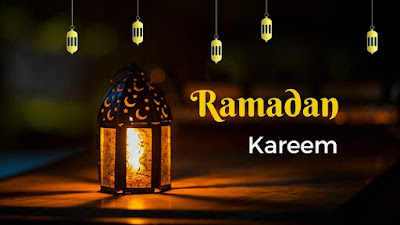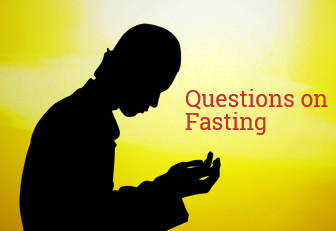Ramadan is the ninth month of the Islamic calendar. Every day of this month, Muslims fast on the day from sun rise to sun set. In the night Muslims gather together to offer Namaz or Prayers in Masjid . These night prayers are called Taraveeh
“Islam is built on five (pillars), testimony that there is no deity worthy of worship but Allah, and testimony that Muhammad is His messenger, establishing Salat, giving Zakaat, observing the fast of Ramadan, and pilgrimage to the House of Allah.” (Bukhari/Muslim)
The hadith established fasting during the month of Ramadan as one of the pillars on which this religion is built. This hadith reinforces the obligation of fasting as stated in Al-Qur'an. We will see later that there are other Hadiths that explain in detail how to observe the 'Ebadah, the worship of fasting.
“Ramadan is the month in which was sent down the Qur'an as a guide to humanity and as a clear 18 sign for guidance and judgment (between right and wrong). So anyone of you who witnesses the month should spend it in fasting...” (Al-Qur'an, 2:185)
This verse contains important rules and reasons for fasting that will be explained later. However, what concerns us here is the statement,
“So anyone of you who witnesses the month should spend it in fasting.”
WHY DO A MUSLIM FAST?
Fasting is one of the best acts of worship. It is mandated by Allah (SWT) to purify the soul along with the practice of good deeds. Thus the faster ought to be aware of acts or behaviors that may spoil his fast so that he or she will attain the highest benefit physically and spiritually.
Fasting is not only restraining oneself from fast-breakers food, drink and sex -that restrain only the mouth and the private parts. Every limb (jawarih) must be restrained. The tongue must desist from slander and back-biting. The eyes must restrain themselves from any unlawful look. The hand must not touch or take what does not belong to it. The ears must not listen to idle talk, gossip, lyrics and notes that contain obscene and indecent things; the nose must fast also by not sniffing, smelling unlawful things. The feet must fast by not going to places where sinful acts are propagated.
When you eat sahuur and iftar, make sure the food on the table has been obtained lawfully. If the servant has observed the fast in these terms and acted accordingly, he or she will have
gained positively by Ramadan and will receive the maximum reward. Hence, fasting is a state of mind that transcends the physical restraint.
In a hadith by Abu Hurairah, the Messenger of Allah (saas) said:
“It is not fasting, just to restrain from food and drink, instead the fast is to cease from idle talk, obscenity, and should anyone insult or provoke you, or act ignorantly towards you, respond to it by saying, ‘I am fasting, I am indeed fasting.’ ” (Ibn Khuzaimah)
The fast is intended to bring the faithful closer to God and to remind them of the suffering of those less fortunate. Muslims often donate to charities during the month and feed the hungry.
Fasting is an exercise in self-restraint. It's seen as a way to physically and spiritually detoxify by kicking impulses like morning coffee, smoking and midday snacking.
Ramadan is a time to detach from worldly pleasures and focus on one's prayers. Many Muslims dress more conservatively during Ramadan and spend more time at the mosque than at any other time of the year.
Fasting during Ramadan is one of the five pillars of Islam, along with the Muslim declaration of faith, daily prayer, charity, and performing the hajj pilgrimage in Mecca.
HOW DO MUSLIMS FAST?
Observant Muslims abstain from eating and drinking from dawn to dusk for the entire month of Ramadan, with a single sip of water or a puff of a cigarette considered enough to invalidate the fast.
Muslim scholars say it's not enough to just avoid food and drinks during the day, though. Spouses must abstain from sexual intercourse during the day, and Muslims should not engage in road rage, cursing, fighting or gossiping.
Muslims are also encouraged to observe the five daily prayers on time and to use their downtime just before breaking their fast at sunset to recite Quran and intensify remembrance of God.
To prepare for the fast, Muslims eat what is commonly called "suhoor," a pre-dawn meal of power foods to get them through the day.
HOW DO MUSLIMS BREAK THEIR FAST?
Muslims traditionally break their fast like the Prophet Muhammad did some 1,400 years ago, with a sip of water and some dates at sunset. That first sip of water is by far the most anticipated moment of the day.
After a sunset prayer, a large feast known as "iftar" is shared with family and friends. Iftar is a social event as much as it is a gastronomical adventure. Across the Arab world, juices made from apricots are a staple at Ramadan iftars. In South Asia and Turkey, yogurt-based drinks are popular.
Across the Muslim world, mosques and aid organizations set up tents and tables for the public to eat free iftar meals every night of Ramadan.
Typically, the start of the month is welcomed with greetings such as "Ramadan mubarak!" (AP Photo)
CAN MUSLIMS BE EXEMPTED FROM FASTING?
Yes. There are exceptions for children, the elderly, the sick, women who are pregnant or menstruating and people traveling, which could include athletes during tournaments.
Many Muslims, particularly those who live in the U.S. and Europe, are accepting and welcoming of others around them who are not observing Ramadan. They also are not expecting shorter work hours, as is the case in the public sector across much of the Arab world during Ramadan.
However, non-Muslims or adult Muslims who eat in public during the day can be fined or even jailed in some Middle Eastern countries, such as Saudi Arabia and the United Arab Emirates, home to large Western expat populations in Dubai and Abu Dhabi.
Meanwhile, minority Chinese Uighur Muslims complain of heavy restrictions by the Communist Party, such as bans on fasting by party members, civil servants, teachers and students during Ramadan, as well as generally enforced bans on children attending mosques, women wearing veils and young men growing beards.
WHAT ARE SOME RAMADAN TRADITIONS?
Typically, the start of the month is welcomed with greetings such as "Ramadan mubarak!" Another hallmark of Ramadan is nightly prayer at the mosque among Sunni Muslims called "taraweeh."
In Egypt, a common sight during Ramadan is a lantern called the "fanoos," which is often the centerpiece at an iftar table and can be seen hanging in window shops and balconies.
In the Arabian Gulf countries, wealthy sheikhs hold "majlises" where they open their doors for people to pass by all hours of the night for food, tea, coffee and conversation.
Increasingly common are Ramadan tents in five-star hotels that offer lavish and pricey meals from sunset to sunrise. While Ramadan is a boon for retailers in the Middle East and South Asia, critics say the holy month is increasingly becoming commercialized.
Scholars are also disturbed by the proliferation of evening television shows during Ramadan. In Pakistan, live game shows give away gifts promoting their sponsors. In the Arab world, monthlong soap operas starring Egypt's top actors rake in millions of dollars in advertising.
HOW DO MUSLIMS MARK THE END OF RAMADAN?
The end of Ramadan is marked by intense worship as Muslims seek to have their prayers answered during "Laylat al-Qadr" or "the Night of Destiny." It is on this night, which falls during the last 10 nights of Ramadan, that Muslims believe that God sent the Angel Gabriel to the Prophet Muhammad and revealed the first versus of the Quran.
Some devout Muslims go into reclusion those final days, spending all of their time in the mosque.
The end of Ramadan is celebrated by a three-day holiday called Eid al-Fitr. Children often receive new clothes, gifts and cash.
Muslims attend early morning Eid prayers the day after Ramadan. Families usually spend the day at parks and eating — now during the day.


































